Yonezawa Engineering Asia (Thailand) Co., Ltd.
- HOME
- Success Stories
- Yonezawa Engineering Asia (Thailand) Co., Ltd.
Turning every encounter into a business opportunity
Leveraging business card information accumulated over 20 years with Sansan
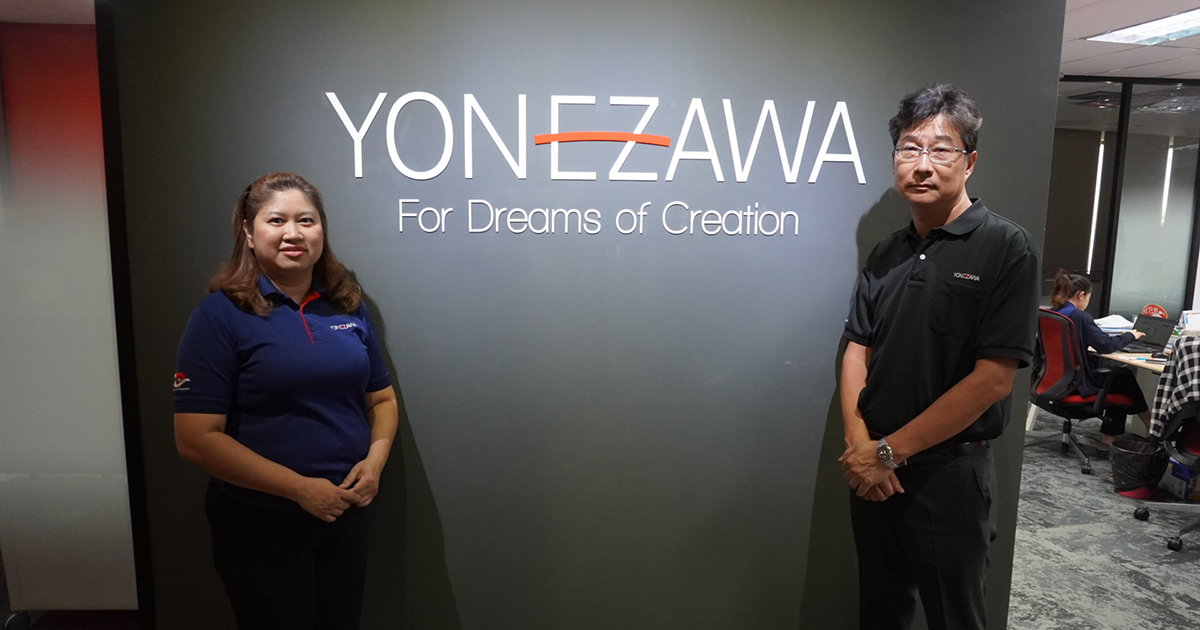
Yonezawa Engineering Asia (Thailand) Co., Ltd., a Thai subsidiary of Yonezawa Koki Co., Ltd., established its presence in Thailand in the early 2000s as a hub for Asia. For nearly a quarter of a century, it has continued to support Thailand’s manufacturing industry by providing machine tools and software. To make more effective use of the business card information it has accumulated over the past two decades, the company implemented Sansan. We interviewed Yonezawa Engineering Asia about the changes and usage methods following the implementation.
Objectives
- Reduction of work time required for business card management
- Elimination of reliance on individuals in sales activities
- Centralized management of customer information
Challenges
- Difficulty in accessing business card information
- Customer information dependent on the person in charge
- Business card data has not been effectively utilized
Outcomes
- Saving of 2.5 hours/day of work time
- Improved access to business card information
- Organizational management and utilization of customer contact information
Supports data digitization in 11 languages,
and has a proven track record and support in Thailand
[ Interviewees ]
Managing Director / Mr. Yuichi Mikami
General Affairs Manager / Ms. Sopita
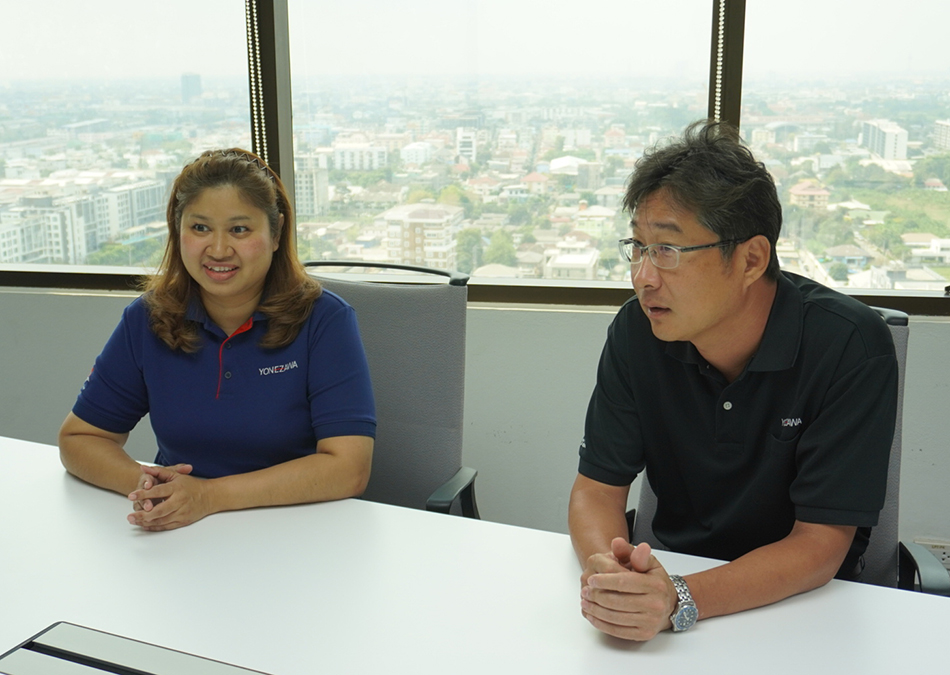
Business card management methods varied from sales staff to
sales staff, and it took time and effort to find them.
Business Overview
Mr. Mikami: We are a trading company specializing in machinery, providing a comprehensive range of machining equipment and manufacturing production systems. Our offerings include machine tools and industrial machinery, as well as various specialized machines such as measuring devices, testing machines, and inspection equipment. Additionally, we supply software, jigs, and tools. Founded in Tokyo in 1954, we have a long-standing history of supporting manufacturing industries. Yonezawa Engineering Asia (Thailand) Co., Ltd., our Thai subsidiary, was established in December 2002. In addition to our presence in Thailand, we have bases in China (Guangzhou),Indonesia, Vietnam, Mexico, and the United States (Ohio).
We do not simply sell machine tools but also strive to accurately understand the challenges faced by our client companies and provide proposals that address their issues and realize their requests. In recent years, labor costs have soared in every country, and uncertainties such as the COVID-19 pandemic have increased the demand for automation and AI utilization. As needs become more diverse and complex, we are required to respond flexibly as a specialized trading company.
Challenges before implementing Sansan
Ms. Sopita: I joined the Thai subsidiary shortly after its founding, and have been with the company for over 20 years. During this time, the number of staff, customers, and orders received has increased year by year. Our sales representatives frequently visit clients, often spending entire days out of the office. It’s not uncommon for them to need contact information while they are out and about. For example, they might say, “We just talked about someone from that company. I need their information right away.” In such cases, they would contact me, the officer at General Affairs, and I had to pause my work to find the business card. Each sales representative managed their business cards in their way, using card boxes or folders. Some cards were sorted by company name, others by the date of exchange, and they were often mixed in three languages: English, Thai, and Japanese. Sometimes, it took nearly half an hour to locate a single business card.
The fact that it supports data digitization in 11 languages, has a proven track record in Thailand, and provides extensive support were decisive factors in our decision to implement it
Decisive factors for implementation
Ms. Sopita: Given the circumstances, we have been aware of the need for business card management for several years. Initially, we compared several business card management services available in Japan, but since most of the business cards we usually exchange are in English or Thai, the first requirement was to support these languages. Another significant factor in our evaluation was the level of support we would receive in Thailand.
The decisive factor in implementing Sansan was its ability to support data in 11 languages, including English and Thai, as well as Japanese. The fact that there are already companies that have adopted it in Thailand was another reassuring factor.
Furthermore, the availability of detailed support from the Customer Success team during the implementation process and the fact that inquiries to the support center can be made in Japanese and English, allowing users to receive direct assistance, were significant factors in our decision.
At first, we were searching for a business card management service. However, we found that Sansan offers not only business card management features but also a function that enables us to track sales activity history. This aspect was particularly appealing to us as a solution to the challenges brought about by the COVID-19 pandemic, which completely transformed our sales operations.
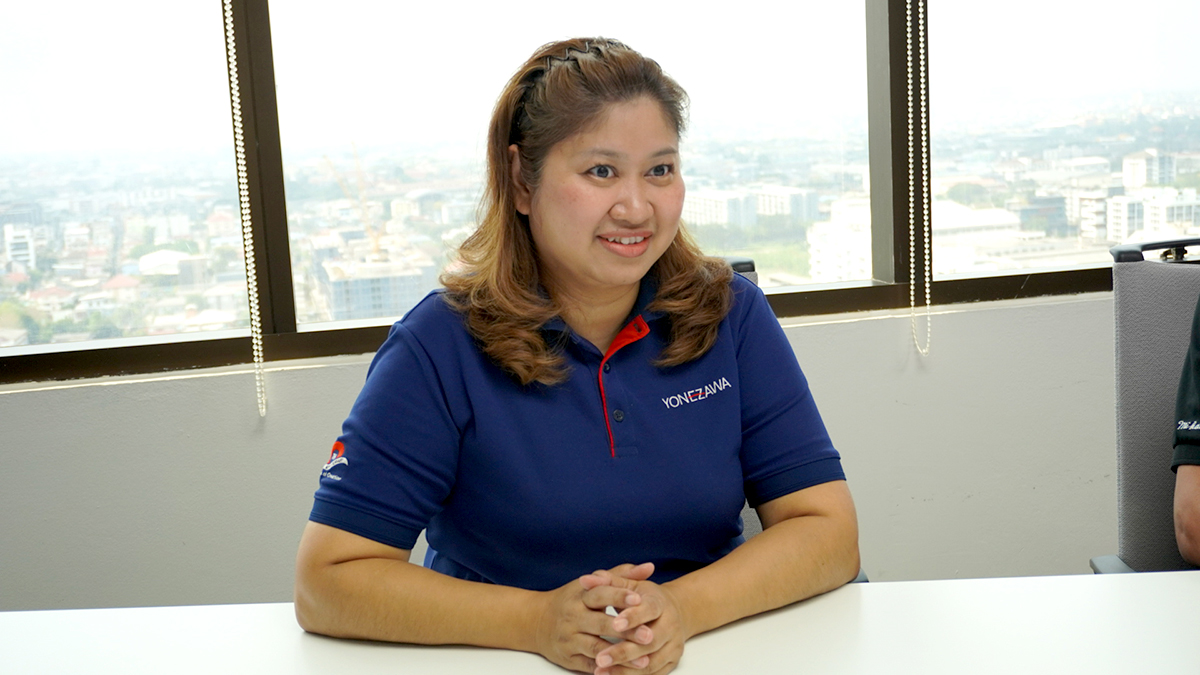
The time spent looking for business cards has been reduced by 2.5 hours per day, and the work of telecommuting employees can now be visualized.
Outcomes after implementation
Ms. Sopita: After implementing Sansan, each member of our team can now search for business card information through a smartphone app from anywhere, reducing requests for assistance from the General Affairs Department to virtually zero. Moreover, the time required to find information has significantly decreased compared to searching through physical cards. With Sansan, we can instantly access business card information by entering the company name, individual’s name, or relevant keyword. The ease of accessing this information has led to increased utilization of the data compared to before implementation. Our sales representatives, in particular, now access the system on average every two days.
Considering the time spent by us, the General Affairs staff, searching for paper business cards upon request, and by sales representatives searching for their paper business cards before implementation, we have reduced our overall workload by about 2.5 hours per day. This represents a significant efficiency gain for our team.
Furthermore, at the time of implementation, we were predominantly working from home due to the COVID-19 pandemic, which made it challenging to monitor sales activities. Sansan’s report feature allows us to log visit histories and business discussion information using business card data. We established registration rules and asked all sales representatives to comply. Before this implementation, some team members documented their sales activities in internal folders, but due to accessibility issues, it was not thoroughly followed by everyone. In that respect, Sansan offers the convenience of accessibility from anywhere, and since customer information is registered via business cards, there’s no need for manual data entry. Categories can be customized for sales activities, and a format for registering business information can be set up, creating a user-friendly workflow that minimizes the effort required from our sales team.
Mr. Mikami: Unlike working in Japan, Thailand offers numerous communities and opportunities to meet people through events, golf, and various other occasions. However, these encounters often end with a one-time meeting. Additionally, as expatriates, we eventually face repatriation or transfers. While we do hand over our responsibilities to our successors, there will inevitably be inadequacies, especially with clients we might have met only once or twice during our tenure. Sansan compensates for these shortcomings by providing information on who and when business cards were exchanged, even if we have only met the person once. Simply scanning the business cards allows us to build a database of encounter histories, which is a significant advancement.
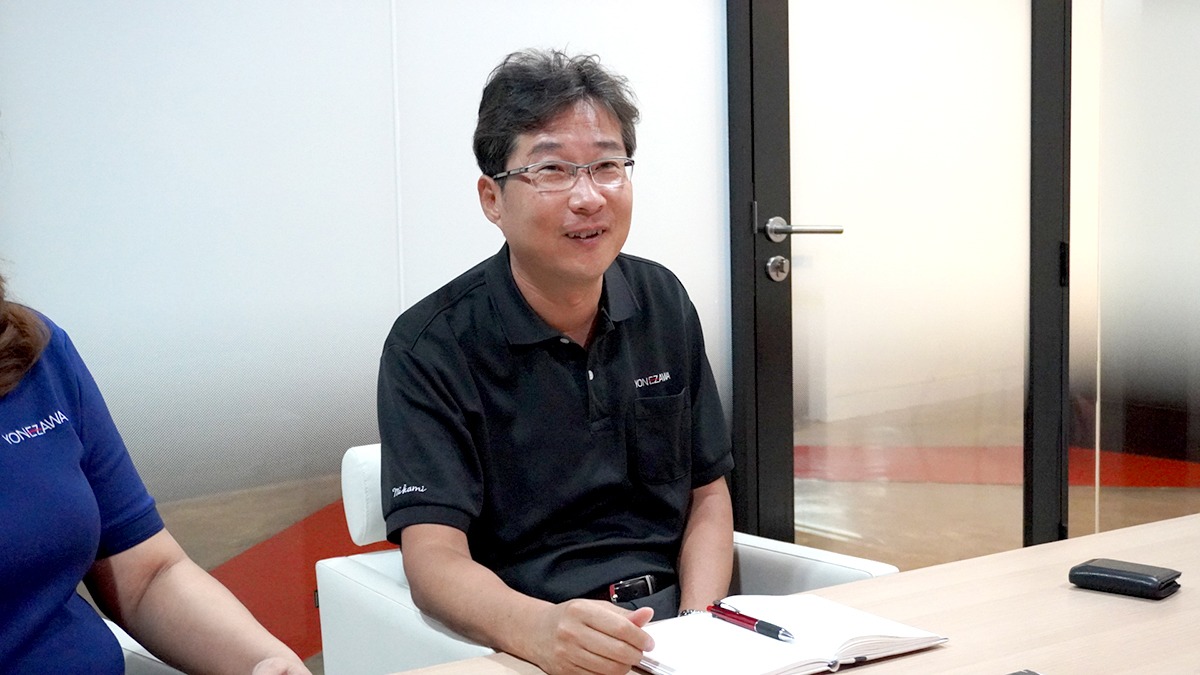
We hope that utilizing Sansan will facilitate communication between Thai sales representatives without relying solely on the personal network of Japanese colleagues
Future utilization
Mr. Mikami: While searching through business card data, there are times when we can only recall having met a client once, but cannot remember the company name or individual’s name perhaps just that the card was reddish or had a specific logo. Sometimes I wish I could search just from such fragmentary memories alone. In such cases, the tag feature becomes highly effective. To improve searchability, we plan to actively utilize this feature. Additionally, we aim to centralize not only business card information and business discussion histories but also project information within Sansan. By consolidating as much information as possible, we believe we can enhance the efficiency of our operations.
We would like to consider using the system not only for sales activities but also for marketing purposes. For example, by using the e-mail distribution function, we believe we can improve the efficiency of our operations, such as sending exhibition invitations and promotion notices, which were previously handled manually.
Ms. Sopita: As the General Affairs Department, we aim to further promote the use of the reporting function. By compiling the entered data, it can be utilized for sales activity reports and meeting materials. We intend to instill this understanding within the company to increase the frequency of information input.
Mr. Mikami: It would be beneficial if it could be used for credit management. Currently, we can only obtain limited information about our business partners from the database such as those published by the Thai Ministry of Commerce. If the registered business card data could be linked to some financial information such as financial reports, it would be valuable for finance and accounting purposes, such as reviewing payment terms.
I have heard that Sansan now offers comprehensive support in Thai. Japanese-affiliated companies in various industries will certainly reduce the number of Japanese expatriates and transition to a system centered on Thai managers. To develop Sansan into a company-wide sales database that includes Thai employees and does not rely solely on the personal networks of Japanese colleagues, we expect that the Thai-language support will further promote its usage.
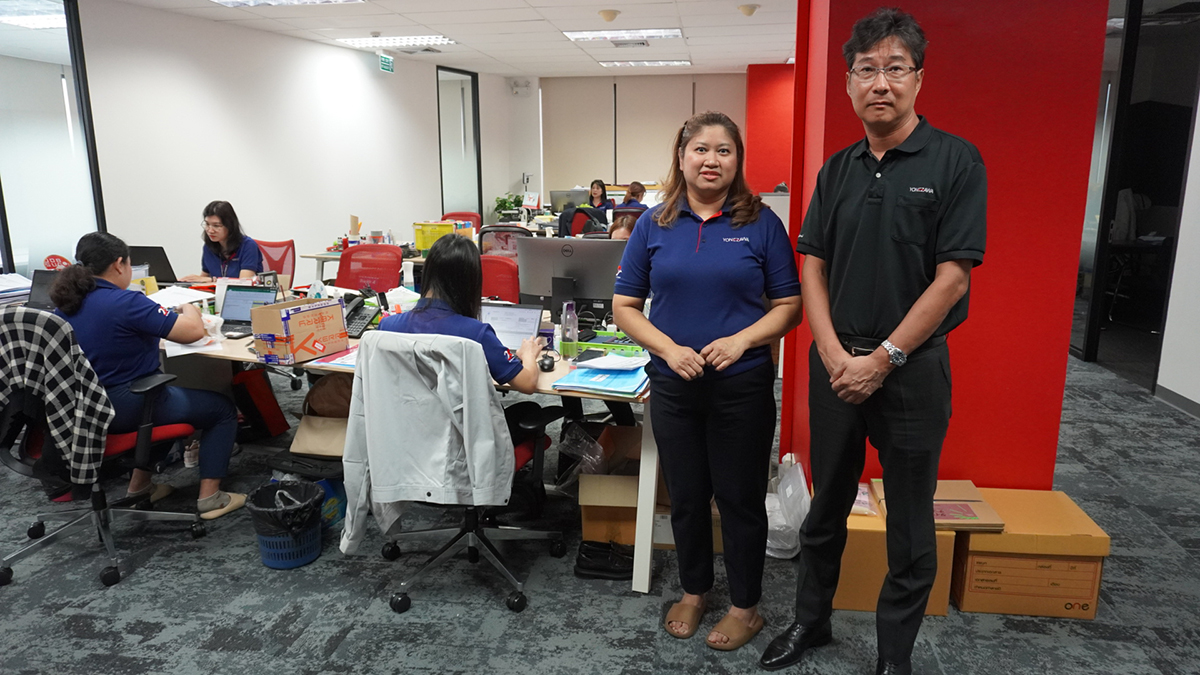
※This article was created in April 2024